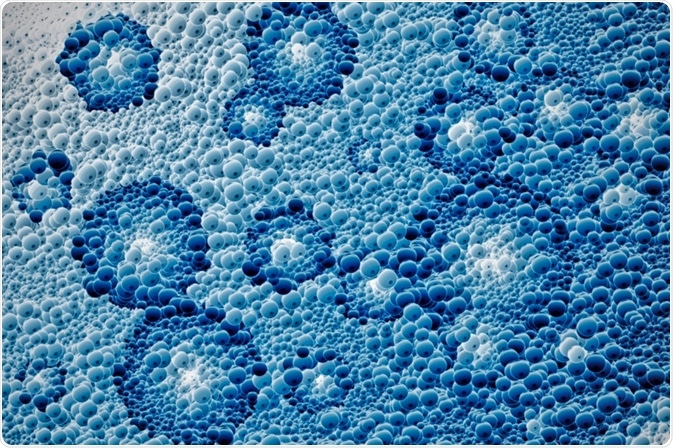Nanomicelles are ultramicrosopic globular structures that consist of exterior hydrophilic polar heads and an interior hydrophobic fatty acyl chain.
 Image Credit: GiroScience / Shutterstock
Image Credit: GiroScience / Shutterstock
In a recent pharmacology study, it was discovered that nanomicelles are capable of delivering poorly water-soluble drugs as well as the protection of drug molecules.
Formulation of nanomicelles
Nanomicelles are typically spherical, but can sometimes take other shapes, such as cylinders and ellipsoids. The small size and shape of nanomicelles is only possible due to the molecular geometry of the particle. The shapes formed also depend on the ionic strength, surfactant concentration, and pH strength of the solutions they are placed in.
In addition, the following factors were empirically-found to influence the formulation and development of nanomicelles:
- Chain length of surfactant molecules – nanomicelles with lower concentrations will form when a molecule’s chain length is longer
- Presence of dissolved salts in the solution lowers critical micelle concentration (CMC)
- Addition of alcohol to water – CMC increases relative to the type of alcohol (ranging from methanol to butanol) that is added to water
- Increase in temperature also increases CMC
- Number of surfactants in the solution, where the overall CMC depends on the nature of each individual surfactant and the surfactant with the highest CMC behaves like an electrolyte
Nanomicelles are formed when amphiphilic molecules assemble themselves to create a globular structure that is only around 5 to 100nm in diameter. The particles may be formed in aqueous or non-aqueous solutions where the nonpolar region forms the interior and the polar region forms the exterior. Because of this, nanomicelles are able to take on both hydrophilic and hydrophobic agents.
Different agents are used to create nanomicelles, however, they are usually made through surfactant molecules that may be non-ionic, ionic, and cationic detergents. Some nanomicelles may also be developed from a mixture of lipids and detergents. The critical micelle concentration and the typical number of detergent molecules are dependent on the amount of lipids and proteins in the micelles.
Uses of nanomicelles
Micelles are used primarily as solutions for membrane proteins. Research shows that nanomicelles are more effective in studying the capabilities of such proteins, than bilayer vesicles because of their relatively smaller size.
Apart from this, empirical evidences also show that nanomicelles could be used as therapeutic interventions involving protein and peptide delivery. For instance, in the optometric industry, the need for stable solutions in ocular medicine targeting anterior- and posterior-segment diseases is on the rise.
The current form of drug delivery through intravitreal injections are not patient-compliant and therefore poses a challenge on patient care and treatment. Researches on bioengineering have found the use of nanomicelles as a smart and efficient drug-delivery system.
Advantages and disadvantages of nanomicelles
The primary advantage of nanomicelles is its core-shell structure. The hydrophobic contents within the nanomicelle shell facilitates the solubilization of hydrophobic drugs in water. At the same time, the hydrophilic shell itself acts as a protection for the drug by eliminating the MPS that enables prolonged circulation.
Another advantage of nanomicelles are their quality as an efficient pharmaceutical content because of their low toxicity, ability to minimize drug degradation, ability to permeate tissues easily for drug delivery, and lower adverse drug side effects.
While nanomicelles have been found to be an effective solution in many therapeutic, medical, and bioengineering problems, studies also found the disadvantages of using nanomicelles in treatment.
The structures have inefficient drug-loading capabilities (smaller than liposomes), poor physical stability in vivo, and insufficient cellular interactions with neutral micelles.
Sources:
- Alexander-Bryant, A.A., Vanden Berg-Foels, W.S., & Wen, X. (2013). Chapter One - Bioengineering Strategies for Designing Targeted Cancer Therapies. Advances in Cancer Research, 118, 1-59.
- Battig, M.R. & Wang, Y. (2014). Nucleic Acid Aptamers for Biomaterials Development. In S. Kumbar, C. Laurencin, & M. Deng (eds.), Natural and Synthetic Biomedical Polymers (pp. 287-299). New York, New York: Elsevier, Inc.
- Joseph, M., Trinh, H.M., & Mitra, A.K. (2017). Peptide and Protein-Based Therapeutic Agents. In A. Mitra, K. Cholkar, & Mandal, A. (eds.), Emerging Nanotechnologies for Diagnostics, Drug Delivery and Medical Devices (pp. 145-167). New York, New York: Elsevier, Inc.
- Kulkarni, V.S. & Shaw, C. (2016). Surfactants, Lipids, and Surface Chemistry. In Essential Chemistry for Formulators of Semisolid and Liquid Dosages (pp. 5-19). New York, New York: Elsevier, Inc.
- Vadlapudi, A. D., & Mitra, A. K. (2013). Nanomicelles: an emerging platform for drug delivery to the eye. Therapeutic Delivery, 4(1), 1–3.
- Wiśniewska-Becker, A. & Gruszecki, W.I. (2013). Biomembrane models. In R. Pigtanello (ed.), Drug-Biomembrane Interaction Studies: The Application of Calorimetric Techniques (pp. 47-95). Cambridge, United Kingdom: Woodhead Publishing.
Further Reading
Last Updated: Feb 26, 2019